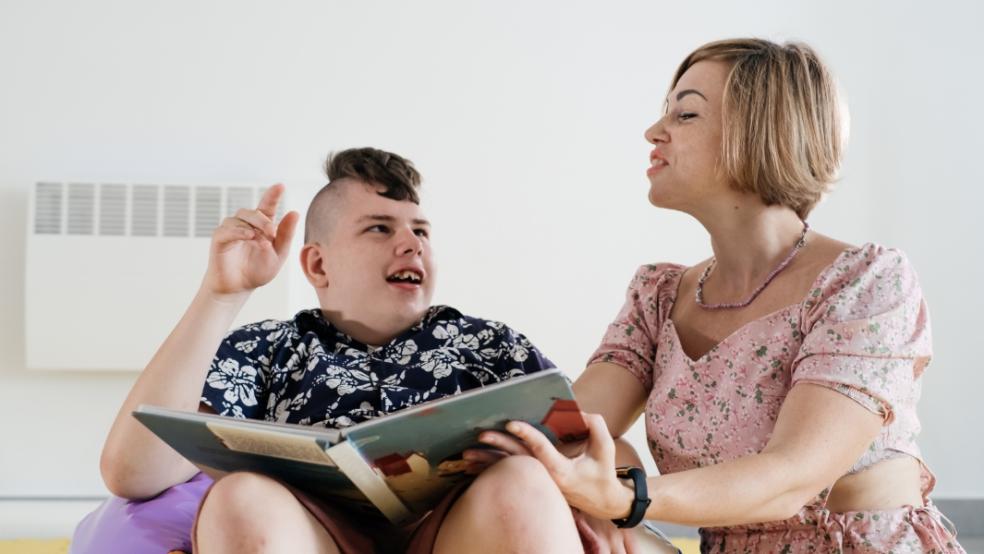
Charity report reveals families raising disabled children are struggling to survive
Stark research findings, released today by national charity Family Fund, show that families raising disabled, or seriously ill, children and young people across the UK now face serious financial jeopardy and are struggling to survive, due to the scale of the cost-of-living crisis.
“The Cost of Caring” covers research with 4,264 families across the UK, with a disabled child, showing that nine in 10 families are struggling, or falling behind on their regular household bills and many are forced to forego living essentials such as food, heating, basic furniture like beds, flooring, washing machines and fridges, to try to make ends meet.
Over half of parents and carers (54%) report skipping or cutting the size of their meals because there wasn’t enough money for food (a 9% increase since September 2021) and more than one in ten (13%) say they have had to cut back on items that are essential for their disabled children.
Four in five families (83%) raising a disabled child or young person are in debt, with rising debt levels for two in five families (43%) polled, and over 40% report they can’t afford to keep accommodation warm - a 13% increase since last December.
On average, families raising a disabled child live on £17,000 a year and spend 60 hours a week caring for their disabled children, with one third caring for over 100 hours a week. Families receive only one hour a week of respite and support, on average, and less than one in four parents and carers are able to work full time, with over half not able to work at all.
Family Fund’s report highlights the, now, unsustainable strain on families raising disabled and seriously ill children and young people , as they try to cover sky-high costs on top of severely reduced incomes due to intense caring responsibilities, three times higher costs to look after a disabled child and critical levels of debt.
With sustained cuts to support services, which have not recovered post-pandemic, families are now having to pay, themselves, for therapies and specialist equipment for their children, such as educational and sensory items and toys.
As the UK’s largest grant-making charity for families raising disabled and seriously ill children on the lowest incomes, Family Fund provides essential goods for families including kitchen appliances, clothing, bedding, play and sensory equipment and much-needed family breaks.
Last year, it delivered over 170,919 grants and services, worth over £37 million, to families on low incomes across the UK.
Wider research findings include:
· Almost all families raising disabled children (98%) report paying more than families with non-disabled children due to specialist needs - clothing (74%), food and groceries (73%), technology such as tablets (66%), toiletries and hygiene products (60%) and replacing worn or broken household items (60%);
· In September 2021, families raising disabled children reported an increase in their household bills of, on average, £800 a year. By June 2022, even before current price rises, this increase was over £1,500.
· Three in five families (62%) reported cutting back on play, leisure and recreational activities with their disabled children during the last year;
· In the past year, 50% of families report their disabled children’s physical health has worsened and 68% say their disabled children’s mental health has deteriorated.
· 1 in 5 families report taking on more credit to keep up with existing credit commitments
Cheryl Ward, Family Fund Chief Executive, said:
“The outlook for families raising a disabled, or seriously ill, child is now graver than ever. They are unsure how to cope with ever-rising caring costs with winter approaching, they are having to borrow more credit to pay for intense levels of debt and feeling more isolated than ever, with worsening mental and physical health.
“These are families on the lowest of incomes, due to caring for their children round-the-clock and having far-reduced available support services, post-pandemic.
“When caring costs have spiralled so far out of control that families are having to cut back on the very essentials their disabled child needs, something has to change.
“Along with our sector partners, we are urging Government to ensure that family benefits are increased in line with inflation, rather than reducing at a time when the escalating costs of caring are already jeopardising families’ lives.”
West Midlands parent: “How will I be able to keep my disabled child warm for medical reasons…this coming winter when I’m struggling to pay gas and electric in summer? How will I afford petrol, which I need as I have two children with physical disabilities including one in a wheelchair. And the cost of food, and availability of safe food for an autistic child if shortages start happening. I worry every day and night over this.”
North West England parent: “Caring for our child is not the issue, she is the light of our lives. Being able to access the right care, education and support in order to provide me the opportunity to work is the key.”
The Cost of Caring features research from the charity’s last four quarterly family polls, from September 2021 to June 2022, ahead of a new September poll coming soon.
Read the full Cost of Caring report here: https://www.familyfund.org.uk/Handlers/Download.ashx?IDMF=79fc6f59-abc5-450f-b95a-d6d674003f41
Family stories:
Archie and Max’s story: Archie, 6, and Max,10, are both autistic. They live in Littlehampton, West Sussex, with their mother, Jo, father, Jamie, and sister Aubrey, 4. Max also has ADHD. Archie suffered brain damage due to a neo-natal infection so as well as being autistic he has learning disabilities, immune deficiency, sensory processing disorder and bowels problems that have left him doubly incontinent.
Jo originally trained as a Special Educational Needs teacher but cannot work now as she is Archie’s full time carer: “The cost-of-living crisis has impacted us in such a huge way. Like many other families raising disabled or seriously ill children, we face the reality of going into debt as opposed to just cutting back. We can’t live without the essentials that already cost us more than the average household.“Since our family needs to do extra washing and have more baths, we’re seeing our utility bills go through the roof.
“We’re having to do almost daily food shops, that can’t be avoided or adjusted due to the specific sensory needs and allergies of the children, which results in food bills almost tripling in most cases.
It’s also costly to provide transport to and from school when your children are both in mainstream and specialist provisions. It’s extortionate! Especially when the local authorities can’t meet the demand so you’re left to pick up the pieces.
“As a family we’re all exhausted and run down. We don’t have the spare money or energy to do things outside of the home. We feel isolated and alone.
“The creeping birthdays and upcoming Christmases put a lot of additional financial and emotional pressure on our situation.There’s not a single day that passes where we’re not having to fight for help or desperately seek relief. It sounds awful, but it’s true.
“The cost of living crisis affects us greatly, but it only magnifies what families like mine have already been suffering with for years!”
Family Fund helped with grants for a 9kg washing machine, to take bigger loads, and a cooker: “They come with a five-year warranty and that gives us peace of mind in case anything goes wrong”, said Jo. Also a new mattress and an iPad for Archie.
Farah’s story: (names have been changed) Farah, aged 11, has cerebral palsy and lives in Glasgow, with her father, Ali, mother, Fatima, and sister and brother. She wears a splint on her right foot to help keep her stable.
Ali said: “From the time we wake up, to the time we go to sleep, myself and my wife are constantly caring for Farah. We do everything for her, including changing her clothes, taking her downstairs, feeding, toileting, and getting her to sleep. It’s turned our life upside down.
“The weather is mild at the moment so we don’t need to put the heating on, but when winter comes and it’s cold I’m worried about what we’ll have to do. We’ve spent evenings in the library or at my parent’s house so that we don’t have to use our energy. It’s horrible to think like this but we’re forced to do it. Never in my wildest dreams did I think I would have to have this thought process.
“The rising cost of living has meant we had to stop our weekend swimming and football classes [which] are far away and the fuel prices mean we can’t afford to travel much by car. Additionally, we don’t go anywhere which is fee paying so we now spend time in the garden or go to the park.”
Family Fund helped with several family break grants over the years which Farah’s family has used to go to London, to the theatre and tourist attractions. Ali said: “Without Family Fund, we wouldn’t have had the chance to leave our city considering how expensive it is, especially on our salary. The breaks give us a chance to recharge and have a break from the pressure. When we come home we feel so relaxed, refreshed and energised.”
Felix’s story: Felix, aged 7, is autistic and lives in Cheshire with mum Joy, dad Matt, sister Rachel, aged 4, and baby brother, Toby.
Joy said: “The cost of living crisis has impacted our lives massively. My husband is a stay at home dad and a carer for Felix. I’m on maternity leave and my money is barely anything. We’re a low income family. We’ve not been able to go on days out. The summer holidays have given us a lot of anxiety since we haven’t been able to afford a holiday.
“We’ve had to reduce what we live off, to afford the bills. We’ve had to become stricter with food, for example making meal plans, sticking to a shopping list, and no meals out or takeaways. Overall, it’s meant less treats for the kids.”
Family Fund helped with a freezer grant to cater for Felix’s dietary preferences so his family can batch cook and buy in bulk, as well as a new trampoline. Joy said: “Felix is always in the garden and absolutely loves the trampoline. It’s a great way to get rid of his energy. Being outside means less screen time, less isolation, and more time playing. It’s made a massive difference.”
George’s story: George, 22, has Downs Syndrome and is autistic. He lives in Derbyshire with mum, Jemma, step-father Shaun and brother Charlie, 19. George has breathing problems and requires an oxygen machine when asleep.
Jemma said: “The cost of living crisis has impacted our lives hugely. I worry about it a lot because when you have a child, like George, who requires the use of an oxygen machine overnight, your bills are horrendous.
“I’ve always been frugal with things but it’s getting to a point where I think I literally can’t cut back anymore. I shop in the cheaper supermarkets and buy the reduced items. I do everything that I can but it comes to a point where there’s nothing more that you can do. We don’t ever eat out or have takeaways.
“We’ve not been on holiday, or go on day trips. Also, because I’m a carer, I can’t even do more hours at work because I don’t have anyone else to look after George. Everything is going up but we don’t have any more money.
“The biggest worry for me is the cost of electricity and running George’s oxygen machine. I genuinely have no idea if I’m going to be able to run that at Christmas. If the cost goes up even more then I probably won’t be able to.
“Furthermore, the cost of fuel is huge. It’s got to the point where I only drive to work and back. I used to take George on drives to visit places, but we can’t afford to do that anymore.”
Family Fund supports young people, like George, through its ‘Your Opportunity’ scheme which provides grants and services to people between the ages of 18 and 24.
Jemma says: “After George turned 18, a lot of the support finished but life didn’t get any easier. Our lives didn’t change, and we still need support.
“Through the Your Opportunity scheme, George received an outside swinging chair and a computer. He absolutely loves the chair. He never used to sit outside before, but now he spends hours on it rocking. George uses the computer for his specialised programmes that help his conditions through education and entertainment. He loves technology.”
Gracie’s story: Gracie, 14, lives in Littlehampton, England, with her mum, Alison, dad, Mark and two sisters. She has been diagnosed with a rare genetic condition called Cardiofaciocutaneous syndrome, she has epilepsy, severe learning disability and is nonverbal. Gracie uses Makaton to communicate and uses a wheelchair and standing frame to aid her movement. She will need additional support for the rest of her life.
Alison said: “Gracie is prone to long status seizures and she’s been on ventilators twice, on life support in London. She has a fragile health status and there’s a lot of uncertainty in our lives. At its worst, we were having to rush Gracie into hospital every four weeks, and then she would have two weeks to recover.
“Gracie is a withdrawn child, since she can’t speak. Her receptive language is far greater than her ability to talk.
“Gracie’s condition has massively affected our family life as we had to sell our business and move closer to our family support network. I haven’t been able to work for a long time since I’ve been helping Gracie with therapies and appointments. Furthermore, our home is adapted with stair lifts, wet rooms and hospital beds.
“A lot of my time is spent caring for Gracie. Although, we do receive occasional overnight respite. Gracie’s condition has massively changed our financial situation. The cost of living crisis has impacted us massively. We don’t have any savings. I’ve had to return to work but that means I will lose a lot of my benefits, such as Carers Allowance.
“Gracie has a lot of necessary equipment that runs on electricity such as the stair lift, epilepsy monitors and tablet. We also have a lot of extra washing due to Gracie’s conditions since she drools and uses up a lot of clothing, bedsheets and towels [and] has to shower a lot more regularly than others since her hygiene is extra important.
“We don’t use the tumble drier anymore. Come winter time it will be troublesome to dry things since we plan to not put the central heating on.”
Family Fund helped Gracie and her family over several years with grants have for a tablet, to aid communication, a dishwasher and bedroom furniture.
Lewis’s story: Lewis, 13, is autistic. He lives in Derbyshire with mum, Sarah, and siblings, Leyla, 17, Kacie, 16, and Ellis, 15.
Sarah said: “Lewis was diagnosed with autism at the age of two. He also has some sensory issues, doesn’t like loud noises or when people touch him. Additionally, Lewis doesn’t walk comfortably. His feet and legs are twisted inwards which means he’s unable to walk long distances and he feels extreme pain.
“I’m unable to fuel my car as much as we used to. It’s a real struggle. Some days I have to take Lewis off school because I can’t afford to drive him there and he doesn’t receive any transport support. His school is 45 minutes away so we can’t walk there either.
“The price of food has gone up. I usually do big shop once a month but if we do run out of food then I have to ask my family for help. My gas and electric bills have increased and I’m behind on council tax.”
Family Fund helped Lewis’ family for several years with grants for a washing machine, family break, bed and mattress, sofa, and garden fence, amongst others. Sarah says, “Receiving a grant for a washing machine was such a blessing. I could have cried when we received it. It was brilliant!”
Muhammed’s story: Muhammed, 11, lives in Cardiff, Wales with mum, Aisha, and his four siblings. Muhammed has been diagnosed with chromosome 9 deletion, which means he is missing development genes.
Aisha said: “As a result, his development is slow, his speech was delayed and he has learning difficulties. Muhammed is 11 years old but developmentally he’s at the age of five or six.
“Muhammed likes to stick to a routine. He likes to know what’s going on so we often have to plan the day before, but sometimes that can’t be done when there’s an emergency, unexpected event, or if the weather changes. He gets upset when the routine changes.
“The cost of living crisis has impacted my family. Usually in the summer holidays we would do lots of activities, we wouldn’t think twice. But this year we can only do one or two activities a week, and we stick to parks since they’re free.”
“Electricity and gas bills are more expensive. Muhammed likes to have the light on all the time, even at night. I drive but, because of the petrol prices, we’ve been walking a lot more now. I only use the car for hospital appointments, shopping and long trips. I used to drive my other children to school but now they get the bus. We try to avoid using the car a lot.
“I don’t know how we’ll cope in the winter with the heating on.”
Family Fund helped provide outdoor play equipment, computer and tablet grants to Muhammed and his family. Aisha said: “I wouldn’t be able to buy a tablet for Muhammed, especially now with the cost of living crisis. It’s a big relief for families like ours.”
Cleo’s story: Cleo, 6, has a rare genetic disorder called Weidemann-Steiner syndrome which causes hypermobility, hypotonia, and global developmental delay. She lives in Oldham with her mother, Jennifer, father, Jamie, and her brother and sister. Cleo is described by her family as “the most loving child that you’ll ever meet. However, she holds on to her emotions and struggles to grasp people outside of our family unit.”
Jennifer says, “We can’t go on normal holidays or shopping trips. Everything has to be planned. We can’t leave the house without her ear defenders. Sometimes we have to show her a video of what we’re going to do beforehand. Everything takes longer as we have to prepare Cleo for wherever we go. It’s exhausting for us. She’s six but small for her age. Everywhere we go we have to carry her. It takes a toll on us as it’s a struggle physically.
“We can’t go to the places we want to go to as much as we would like because we can’t afford to anymore. We do plan food well but our food bill has gone up £20 a week and that’s just on the basics.
“We haven’t been eating as healthy as we used to because we’ve found ourselves cutting those healthy meals out because we can’t afford it.
“Our gas and electric bill has already gone up. We’ve not been able to put the hot tub on as much which has had a knock on affect with Cleo as it was such great source of pain relief for her hypermobility. Cleo cries with pain every night and we’ve not been able to use it.”
Family Fund helped with a range of grants for Cleo and her family including for a tablet, a hot tub for Cleo’s hypermobility, family breaks and play equipment. It also provided a grant to cover the cost of attending the Weidemann-Steiner syndrome conference “which was awesome” said Jennifer “as we got to meet a lot of other families in similar situations to us. We made some really nice friends and the conference was super helpful.”














